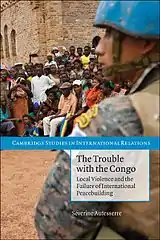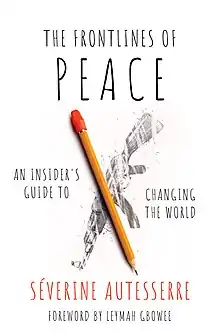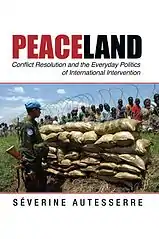Séverine Autesserre
Séverine Autesserre (born 6 December 1976) is a French-American author and researcher.[3] She writes about war and peace, peacebuilding, peacekeeping, humanitarian aid, and the ongoing conflict in the Democratic Republic of Congo. Her research has influenced policy interventions as well as scholarly debates on peacebuilding and on Congo. She is a Professor of Political Science at Barnard College, Columbia University (New York, US), where she specializes in international relations and African studies.
Séverine Autesserre | |
|---|---|
 | |
| Born | 6 December 1976 Paris, France |
| Occupation | Researcher and professor |
| Known for | Research on peacebuilding, peacekeeping, and humanitarian aid |
| Title | Professor of Political Science at Barnard College, Columbia University |
| Academic background | |
| Education | Yale University (post-doctorate), New York University (Ph.D), Columbia University (master's degree), Sciences Po (master's degree), Sorbonne University (B.A.) |
| Academic work | |
| Notable works | Peaceland (2014)[1] and The Trouble with the Congo (2010)[2] |
| Website | severineautesserre |
Education
Autesserre holds a post-doctorate from Yale University (2007), a Ph.D. in political science from New York University (2006), master's degrees in international relations and political science from Columbia University (2000) and Sciences Po (France, 1999).[4] respectively, and a B.A. in political science from Sorbonne University (France, 1997).[5]
Books and scholarly publications
Autesserre's early research focused on local violence and international intervention in the eastern part of the Democratic Republic of Congo. It culminated in her book, The Trouble with the Congo: Local Violence and the Failure of International Peacebuilding, released by Cambridge University Press in 2010.[2] This book explains why international efforts to end civil wars often fail.[6] Drawing from interviews and field research, it presents a case study of the international intervention during the Democratic Republic of Congo's unsuccessful transition from war to peace and democracy (2003–06).[7] It argues that local rivalries over land, resources, and political power motivated widespread violence. However, an international peacebuilding culture shaped the intervention strategy in a way that precluded action on local conflicts, ultimately dooming the international effort.[8]


Research for this project also appeared in Foreign Affairs,[9] International Organization[10] the Review of African Political Economy,[11] the African Studies Review,[12] the African Security Review,[13] International Peacekeeping,[14] the Revista de Relaciones Internationales,[15] and the Journal of Humanitarian Assistance.[16]
Autessere's second book, Peaceland: Conflict Resolution and the Everyday Politics of International Intervention, was released by Cambridge University Press in 2014[1] and focuses on the everyday elements that influence peacebuilding interventions on the ground.[17] It included fieldwork in the eastern Democratic Republic of Congo and comparative research in Burundi, Cyprus, Israel and the Palestinian Territories, South Sudan, and Timor-Leste.[18] The book suggests a new explanation for why international peace interventions so often fail to reach their full potential.[19] It demonstrates that everyday elements – such as the expatriates’ social habits and common approaches to understanding their areas of operation – strongly influence peacebuilding effectiveness.[20] Through this analysis of the interveners’ everyday life and work, Peaceland proposes innovative ways to better help host populations build a sustainable peace.[21]

Findings from this project have also appeared in Critique Internationale[22] and African Affairs.[9]
Autesserre is working on a third book, from which findings have appeared in International Peacekeeping, the International Studies Review, the Washington Post, and Foreign Affairs.[23][24][25]
Media
Autesserre has published columns, essays, and op-eds in The New York Times,[26] The Washington Post,[27] Foreign Affairs,[28] Foreign Policy,[29] African Arguments,[30] and The International Herald Tribune.[31] In 2014 she gave a TED talk that has since been translated into 19 languages.[32]
Teaching
Autesserre has taught at New York University, Yale University and currently teaches at Columbia University's Barnard College,[33] School of International and Public Affairs,[34] and Graduate School of Arts and Sciences.
Influence and awards
According to Google Scholar, Autesserre's work has been cited in more than 3,000 scholarly texts,[35] including more than 1,000 works citing The Trouble With the Congo[36] and more than 700 works citing Peaceland.[37]
Her two books positioned Autesserre as "an authoritative voice" on international humanitarian interventions.[38] Her publications on peacebuilding have helped shape intervention strategies for several United Nations departments,[39][40] foreign affairs ministries, philanthropists,[41] activists,[42] and non-governmental organizations. She has testified before the U.S. Congress,[43] and her research was quoted in debates at the U.S. House of Representatives[44] and the Canadian Congress.[45] Her publications have helped put local conflict resolution on the agenda of policy-makers and practitioners working in Congo.[46][47]
She has been invited to present her research in Australia,[48] Brazil,[49] Canada,[50] France,[51] Germany,[52] the United Kingdom,[53] Sweden,[54] and Switzerland.[55]
Autesserre's first paper won the 2006 Best Graduate Student Paper award from the African Studies Association,[56] and her article "Dangerous Tales" won the 2012 Best Article award from the African Politics Conference Group.[57] The same year, her book The Trouble with the Congo won the Grawemeyer Award for Ideas Improving World Order[58] (at the time, she was the youngest recipient of the Grawemeyer Award). The book also won the 2011 Chadwick Alger Prize presented by the International Studies Association to the best book on international organizations and multilateralism.[59]
Autesserre's work Peaceland won the 2016 Best Book of the Year Award[60] and the 2015 Yale H. Ferguson Award[61] from the International Studies Association, as well as honorable mentions for three other book prizes: the 2014 African Argument Book of the Year,[62] the 2015 Chadwick Alger Prize from the International Studies Association,[63] and the 2015 Conflict Research Society Book of the Year.[64]
Her research has won her an Emerging Scholar Award from the International Studies Association (2021),[65] a Special Prize of the Jury from the French Red Cross Fund (2017), an Andrew Carnegie Fellowship (2016),[66][67] a 2016 Foreign Policy Interrupted fellowship, two research awards from the United States Institute of Peace (2004–05 and 2010–12),[68] two Harry Frank Guggenheim Foundation research grants (2010 and 2011), a Presidential Research Award from Barnard College (2010), several grants from Columbia University (2010–13), two Mellon Fellowships in Security and Humanitarian Action (2004–06), and a Fulbright Fellowship (1999–2000).[69]
She is one of the seven main characters in Timothy Pachirat's book Among Wolves.[70]
References
- Autesserre, Severine (2014). Peaceland: Conflict Resolution and the Everyday Politics of International Intervention. New York: Cambridge University Press.
- Autesserre, Severine (2010). The Trouble with the Congo: Local Violence and the Failure of International Peacebuilding. New York: Cambridge University Press.
- "Analysis of what went wrong in Congo wins Grawemeyer Award". Grawemeyer Award. 8 November 2011. Retrieved 12 December 2016.
- "Severine Autesserre - Barnard Faculty Profile". Barnard College - Columbia University. Retrieved 15 December 2016.
- Autesserre, Severine. "Severine Autesserre - CV" (PDF). Retrieved 4 November 2020.
- Clark, John F. (2011). "Book review: The Trouble with the Congo". Perspectives on Politics. 9 (4): 202–203. Retrieved 12 December 2016.
- Popiden, Sandra (2013). "Local dimensions of war and peace in the Democratic Republic of Congo". International Studies Review. 15 (2): 302–306. doi:10.1111/misr.12039.
- Nordås, Ragnhild (November 2012). "Book Notes: The Trouble With the Congo". Journal of Peace Research. 49 (6): 873–881. doi:10.1177/0022343312465518. S2CID 220786215.
- Autesserre, S. (2012). "Dangerous tales: Dominant narratives on the Congo and their unintended consequences". African Affairs. 111 (443): 202–222. doi:10.1093/afraf/adr080.
- https://www.cambridge.org/core/product/identifier/S0020818309090080/type/JOURNAL_ARTICLE
- Autesserre, Séverine (2007). "D. R. Congo: Explaining Peace Building Failures, 2003-2006". Review of African Political Economy. 34 (113): 423–441. doi:10.1080/03056240701672510. S2CID 53366333.
- https://www.cambridge.org/core/journals/african-studies-review/article/div-classtitlelocal-violence-national-peace-postwar-settlement-in-the-eastern-dr-congo-20032006div/8AEB72455D2B584F3725A97610C6B440,
- http://www.tandfonline.com/toc/rasr20/20/2
- Autesserre, Séverine (2016). "The responsibility to protect in congo: The failure of grassroots prevention". International Peacekeeping. 23: 29–51. doi:10.1080/13533312.2015.1080595. S2CID 2303326.
- "Relaciones Internacionales".
- "Pre-2007 articles | the Journal of Humanitarian Assistance".
- Demarest, Leila (25 November 2014). "Peaceland: Conflict resolution and the everyday politics of international intervention". African Affairs. 114 (454): 158–160. doi:10.1093/afraf/adu070. Retrieved 12 December 2016.
- Mobydeen, Lana (2016). "Book Reviews Peaceland: Conflict Resolution and the Everyday Politics of International Intervention". Peace Review. 28 (3): 380–382. doi:10.1080/10402659.2016.1201963. S2CID 151843027.
- Peake, Gordon (2016). "If This Is the Way the World Works ...". International Peacekeeping. 23 (1): 196–210. doi:10.1080/13533312.2015.1126519. S2CID 147453067.
- H-Diplo (2016). "Roundtable 9-5 on Peaceland: Conflict Resolution and the Everyday Politics of International Intervention". H-Diplo ISSF Roundtable. XI (5). Retrieved 12 December 2016.
- Tétreault, M. (2015). "Peaceland: Conflict resolution and the everyday politics of international intervention". Choice. 52 (5): 887–888. doi:10.5860/choice.186665. ProQuest 1647791675.
- http://www.sciencespo.fr/ceri/sites/sciencespo.fr.ceri/files/critique_add/art_sa.pdf
- Autesserre, Séverine (6 April 2017). "The Right Way to Build Peace in Congo". Foreign Affairs : America and the World. ISSN 0015-7120. Retrieved 14 June 2020.
- Autesserre, Séverine (14 August 2019). "What the Uproar Over Congo's Elections Misses". Foreign Affairs : America and the World. ISSN 0015-7120. Retrieved 14 June 2020.
- Autesserre, Séverine (29 January 2019). "The Crisis of Peacekeeping". Foreign Affairs : America and the World. ISSN 0015-7120. Retrieved 14 June 2020.
- "Start Building Peace in Congo at the Grass-Roots Level". New York Times. 29 November 2012.
- "Here's what Congo can teach the world about peace". Monkey Cage – The Washington Post. 19 October 2016.
- "The Trouble With Congo". Foreign Affairs (May/June 2008). 2008.
- "Trouble in Peaceland". Foreign Policy. 6 October 2015.
- "The Continuing Trouble with the Congo". African Arguments. 1 August 2012.
- Autesserre, Severine (22 June 2012). "The Only Way to Help Congo - The Opinion Pages - Global New York Times". Retrieved 12 December 2016.
- "Séverine Autesserre, TED talk". TED website. Retrieved 9 January 2017.
- "Severine Autesserre - Barnard Faculty Profile". Barnard College - Columbia University. Retrieved 12 December 2016.
- "Séverine Autesserre, SIPA faculty profile". SIPA website.
- https://scholar.google.com/citations?user=uJt8odkAAAAJ&hl=en
- https://scholar.google.com/scholar?oi=bibs&hl=en&cites=18284947723613336595,10639451684674028899,12277483694318593174,15678577545649401637,11449412497252309522,17137646550195337269,15518952348744297567,15787453503439890058
- https://scholar.google.com/scholar?oi=bibs&hl=en&cites=1773918121262217732,11603782889310602456,814438852845099225,15526147527626781848,1704733872155876633
- Veit, Alex (15 June 2015). "Review of "The Trouble with the Congo" and "Peaceland"". European Journal of International Relations. 2 (1): 121–127.
- Benner, Thorsten (1 November 2011). "Heart of Darkness". Survival. 53 (5): 169–178. doi:10.1080/00396338.2011.621642. ISSN 0039-6338. S2CID 219639176.
- de Vries, Hugo (2015). Going around in circles: peacekeeping and stabilization in Congo. Clingendael institute – via http://www.clingendael.nl/sites/default/files/going_around_in_circles.pdf.
- "When It Comes to Promoting Peace, Where Can Funding Do the Most Good?". Inside Philanthropy. Retrieved 8 January 2017.
- Cohen, Noam (11 March 2012). "'Kony 2012' Video Illustrates the Power of Simplicity". The New York Times. ISSN 0362-4331. Retrieved 8 January 2017.
- "Subcommittee Hearing: Resolving the Political Crisis in the Democratic Republic of the Congo - Committee on Foreign Affairs". Committee on Foreign Affairs. Retrieved 3 December 2017.
- United States House of Representatives Committee on Financial Services (16 May 2013). "Memorandum - Subject: May 21, 2013, Monetary Policy and Trade Subcommittee Hearing on "The Unintended Consequences of Dodd-Frank's Conflict Minerals Provision"" (PDF). Retrieved 8 January 2016.
- "Comités de la Chambre des communes - SDIR (40-3) - Témoignages - Numéro 033". www.parl.gc.ca. Retrieved 8 January 2017.
- Legatis, Rousbeh (20 September 2013). "Congo-Kinshasa: Q&A - Congolese Wrongly Branded As "Pathological"". Inter Press Service. Retrieved 8 January 2017.
- Lemarchand, René (1 November 2013). "Reflections on the Recent Historiography of Eastern Congo". The Journal of African History. 54 (3): 417–437. doi:10.1017/S002185371300073X. ISSN 0021-8537.
- "International Dynamics of Making Peace and Preventing Atrocity: Where do We Stand". 12 October 2016.
- "Palestra Peaceland: Conflict resolition and the everyday politics of international intervention | AAA PUC".
- "Peaceland: Conflict Resolution and the Everyday Politics of International Intervention".
- "Débat du 19 juin 2015 | Newsletters".
- "BICC Press/Press releases/".
- "Peaceland: Conflict resolution and the everyday politics of international intervention | Annual Elizabeth Colson Lecture 2016 — Refugee Studies Centre".
- http://www.nai.uu.se/events/Severine-Autesserre-5-May-2015.pdf
- http://koff.swisspeace.ch/fileadmin/user_upload/koff/Documents/Invitation_KOFF_Roundtable_Success_and_Failure.pdf
- "Graduate Student Paper Prize Winners". African Studies Association. Retrieved 12 December 2016.
- "African Politics Conference Group - Past Awards". African Politics Conference group. Retrieved 12 December 2016.
- "Analysis of what Went Wrong in Congo Wins Grawemeyer Award". Grawemeyer Awards. Retrieved 12 December 2016.
- "Chadwick Alger Prize - Past Recipients". International Studies Association. Retrieved 12 December 2016.
- "ISA Annual Best Book Award". International Studies Association. Retrieved 12 December 2016.
- "Yale H. Ferguson Award - Past Recipients". International Studies Association.
- African Arguments Editor (5 January 2015). "African Arguments Book of the Year". African Arguments. Retrieved 12 December 2016.
- "Chadwick Alger Prize - Past Recipients". International Studies Association.
- "The Conflict Research Society Book of the Year". CRS - Conflict Research Society. Retrieved 25 December 2016.
- "Congratulations to Severine Autesserre for Winning the 2021 Emerging Scholar Award". Twitter.
- "Announcing the 2016 Andrew Carnegie Fellows". Carnegie Corporation of New York. 19 April 2016.
- "Meet Carnegie Fellow Severine Autesserre". Political Science Now. 5 August 2016.
- "The Trouble with the Congo". United States Institute of Peace. Retrieved 14 December 2016.
- "Interview with Séverine Autesserre". Foreign Policy Interrupted. 5 December 2016.
- Timothy Pachirat, Among Wolves: Ethnography and the Immersive Study of Power. Routledge, 2017.
External links
- Author's official webpage, Twitter, and Facebook pages
- Faculty profiles at Columbia University (Barnard, SIPA, and Saltzman Institute for War and Peace Studies)
- Publications on free access via Columbia Academic Commons